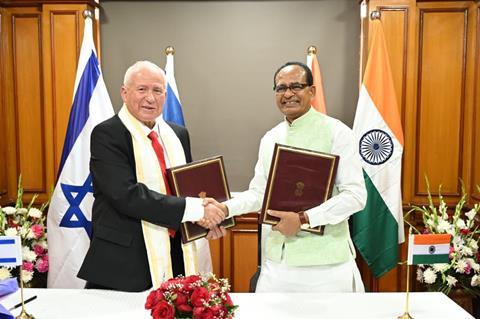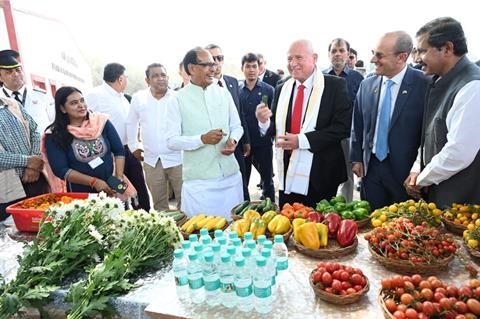New agreement sees countries collaborate on food security, technology transfer, the development of high-quality seeds and the advancement of post-harvest technologies
Israel and India have signed an Agriculture Cooperation Agreement and Work Plan marking the strengthening of their agricultural partnership.

On 8 April India’s union minister for agriculture, farmers’ welfare and rural development, Shri Shivraj Singh Chouhan, met with Israel’s minister of agriculture and food security, Avi Dicter, for the signing at the International Guest House, National Agricultural Science Complex in New Dehli.
The agreement is set to strengthen the cooperation between the countries in the fields of soil and water management, horticultural and agricultural production, post-harvest and processing technology, agriculture mechanisation, animal husbandry and research and development.
As part of the meeting India requested Israel to provide market access for onion, potato, garlic, green chilies, turmeric, pineapple, mango, pomegranate, grapes, and okra seeds, according to reporting from Business Standard.
“On day-to-day trade, we are going to communicate to both Plant Protection Indian Israel Services (PPIS) in order to make sure that we shall be able to increase merchandise shipments from one side to the another,” Dichter told media after the meeting.
Dicter also highlighted that both countries can work together in the development of high yielding seed varieties and technology adding that innovation in the agriculture sector is required to ensure food security in future.

The two sides agreed on the need to work together on several key areas, including food security, technology transfer, the development of high-quality seeds, the expansion of Centers of Excellence (CoE), research and development, pest management, capacity building, and the advancement of post-harvest technologies. Additionally, they agreed to explore a Five-Year Seed Improvement Plan (FYSIP) to enhance agricultural productivity and sustainability.
Considering the challenges of increasing population and decreasing landholdings, Chouhan emphasised the need to enhance agricultural productivity. He underlined the importance of collaborative efforts between scientists from the two countries to ensure that improved seeds reach farmers.
The meeting also saw discussions on various innovations of importance with Israel showing interest in India’s digital agriculture mission and the way it is empowering farmers in India.
Chouhan reiterated India’s commitment to global welfare, highlighting how India and Israel can contribute significantly to resolving the global food security crisis. A Joint Working Group is being established to ensure continuous dialogue and the development of a clear roadmap with defined goals and timelines.



